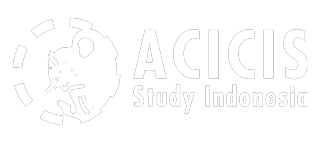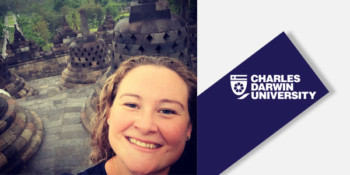Kelly McMurtrie-Penning is a New Colombo Plan Mobility Grant recipient from Charles Darwin University. Kelly undertook the Public Health Study Tour in November-December 2019.
Q:Why did you decide to undertake the ACICIS Public Health Study Tour?
As part of my Bachelor of Nursing Degree, the opportunity to apply for the ACICIS program came up through my public health studies. The program appeared to be an excellent opportunity to explore the public health system of a neighbouring country that has strong links to Australia and the Northern Territory in particular. Indonesia is a country that is doing its best to change the lives of its people by investing in a universal health care system, like that of Australia and I was interested in observing the development of this change and comparing the systemic differences.
Q: Did you receive a New Colombo Plan Mobility Grant? If so, how did this contribute to your experience in Indonesia?
I was very lucky to be granted a New Columbo Plan Mobility Grant, and this made my experience in Indonesia so much easier financially as I knew I would be able to take on this wonderful opportunity without negatively impacting my family while I was away.
Q: What did you find to be the most challenging about your experience on the PHST?
The biggest challenge, for me, was to always remember that things are not always as they appear. While things can look disorganised compared to our personal ‘western’ experiences or expectations, this doesn’t mean that the method is wrong. Something I always try to remind myself of when I am in altered circumstances is that “it is not wrong; it is only different”, and when you let go of your expectations, it is amazing what you can learn and discover.
Q: What public health issues in Indonesia have you become more interested in/aware of as a result of this tour?
I was fascinated by the Wold Mosquito Project in Yogyakarta and the progress they have made in the reduction of mosquito-borne diseases. Learning that the project was one started in Cairns, Australia and has grown to include Indonesia in such a successful way is inspiring and meeting the people behind the project was great.
I also loved learning about the changes being made to the housing and development for people who live close to waterways, particularly in Kali Code, Yogyakarta. Knowing that the Indonesian Government is working with the local people to improve infrastructure, plumbing, water quality and waste disposal is wonderful as it provides the people with a future that is healthy and safe.
Q: What was your favourite field trip?
I loved visiting the Posyandu and meeting all the mothers and children while they were given support and education on everything from nutrition and hygiene to childhood development. It was wonderful to see everyone work together and use the time to bond with their children and others in a socially supportive environment. Support and non-judgmental advice are so important in parenting and knowing that the local communities are valuing this for their mothers and children is great – it is setting up the next generation for an excellent start in life.
Q: How do you think the Public Health Study Tour will influence your future career or studies?
I think that the Public Health Study Tour has reinforced my passion for public health, particularly in childhood health and development. It has given me a new appreciation for the ‘simple’ things I take for granted on a daily basis; clean drinking water directly from the tap, toilets that flush into a closed and sanitary system and a well established public health service that has always been free and available throughout my lifetime and will be for my children.
I am dedicated to being a supportive, compassionate and caring health professional for everyone who comes under my care and I am looking forward to making a difference every day.
Q:What did you most enjoy about the seminar series?
The seminar series gave us an opportunity to understand more about the health issues facing Indonesia’s people and the potentially challenging reasons that they remain an issue. Being able to openly discuss the religious, political or social considerations behind the health issues helped to form a clearer idea on why these ‘norms’ cannot be disregarded in relation to health and health services in Indonesia.
This was particularly obvious when discussing LGBTIQ health, STI’s and contraception/family planning.
Q: What was your favourite aspect about visiting Indonesia?
I had never travelled to Indonesia, and it was so amazing to be able to discover the history and legacy of this beautiful country. The people are very kind and they have a long history to be very proud of. Visiting the Buddhist and Hindu temples, the President’s Museum, Botanic Gardens and exploring the local areas personally was such an eye-opening experience. I would recommend this opportunity to everyone.


